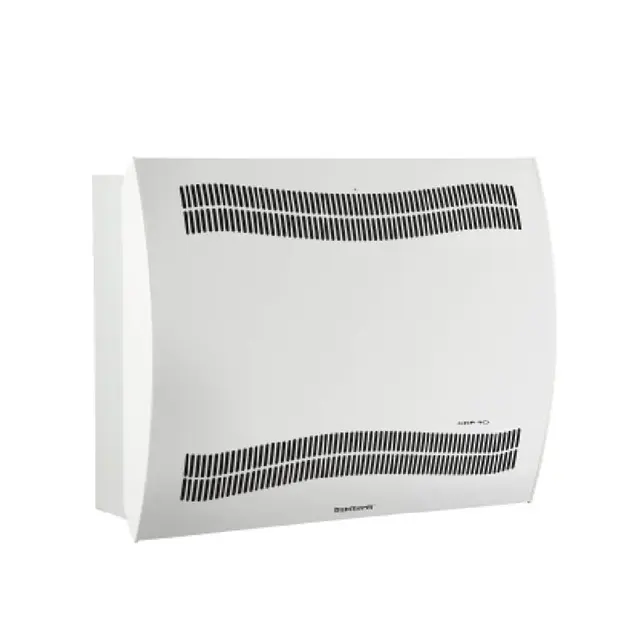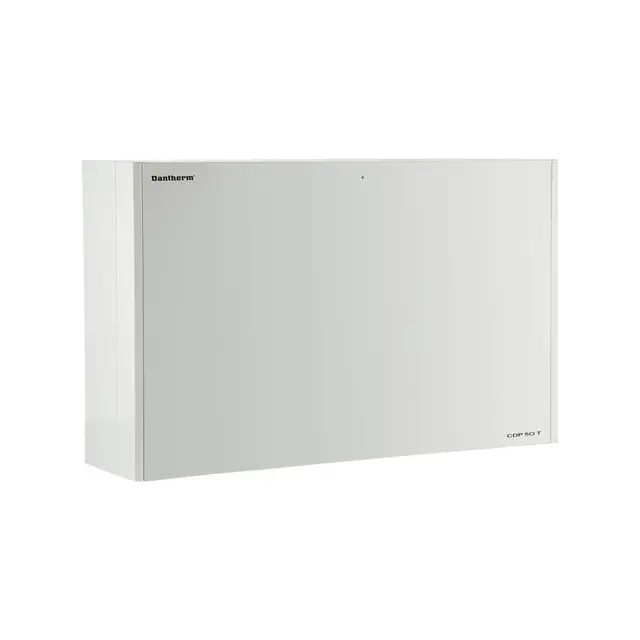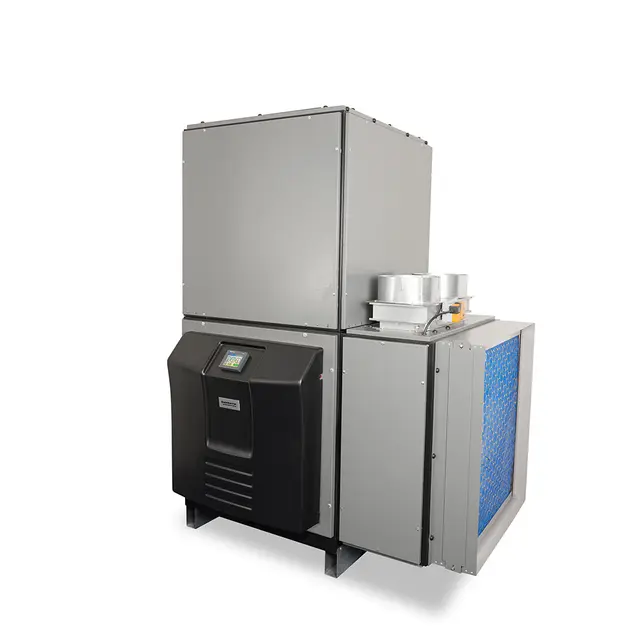What size swimming pool dehumidifier should I buy?
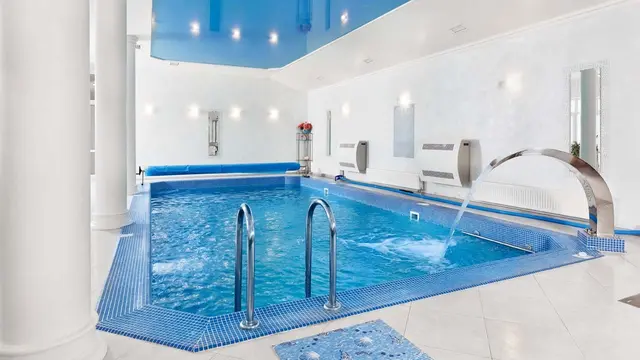
- Home
- Insights
- Humidity control and drying insights
- What size swimming pool dehumidifier should I buy?
Find out what factors contribute to choosing the right size swimming pool dehumidifier for your needs, and how this choice is key to creating a safe, comfortable setting for users and the surrounding pool room.
Over the course of a week, your indoor swimming pool can see hundreds, if not thousands of litres of water evaporate into the air depending on its surrounding environment.
This massive volume of water has to go somewhere, and without a dehumidifier the majority of it will be trapped indoors, sending the air humidity soaring. While it may be comfortable at first, as the moisture builds, you risk negatively impacting guest health, comfort and more.
To keep your conditions at optimal levels, it is crucial to choose swimming pool dehumidifiers that are right for your indoor pool. However, with a dizzying number of options on the market, it can be difficult to know where to start, or what size and type of solution is best suited to your specific needs.
Why do I need to manage humidity in my indoor pool?
The vast majority of indoor and commercial swimming pools have dedicated dehumidifiers or swimming pool air handling units in place to regulate the humidity levels indoors.
Without a designated solution installed, it can quickly lead to greater guest discomfort, poor health, and the development of mould and mildew in your building.
How humid should a pool room be?
To create an atmosphere you and your visitors enjoy spending time in, the inside air must be neither too dry nor too humid.
If the air is excessively dry, it can make swimmers feel cold as soon as they exit the pool. This is because the rate at which moisture is evaporated from their skin is heightened in drier conditions. By the same token, pool water also evaporates at a faster rate, resulting in a greater loss of energy.
On the other hand, air that is too moist can feel uncomfortable for swimmers as these conditions are ideal for harbouring bacteria. As a result, excessively humid air increases the risk of illness spreading and respiratory problems developing.
To create the ideal conditions within your private pool area, it’s important to keep the relative humidity (RH) between 50% and 65%. However, this can still prove an elusive target as RH is influenced by the temperature indoors – the warmer the air, the more water it can hold.
This means that, depending on the type of pool you have, you may require different dehumidifiers to create the optimal environment. A spa, for example, will be kept at a higher temperature than a standard private pool area, so will require a more powerful dehumidifier to ensure the relative humidity remains at a comfortable level.
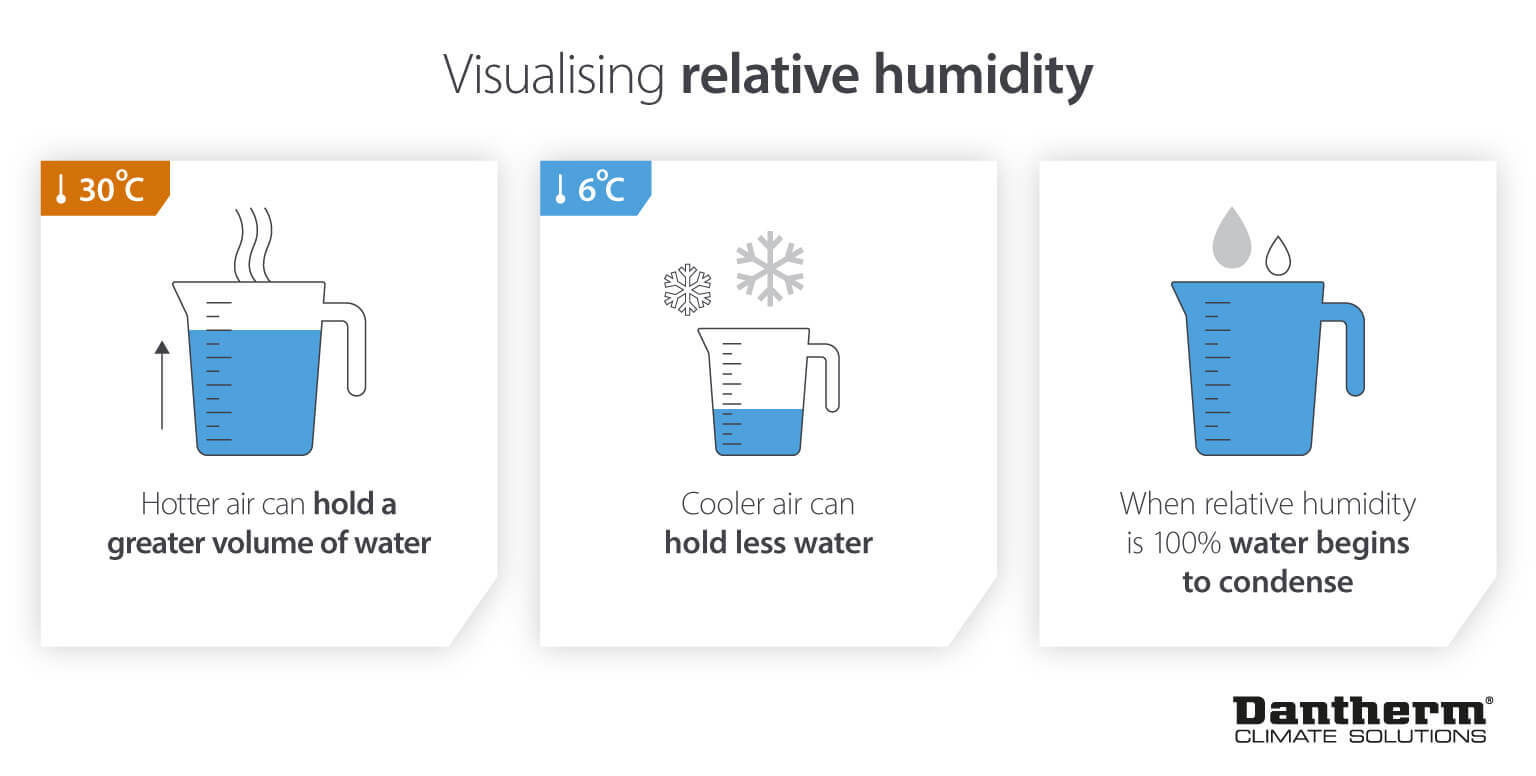
How to determine the size of pool dehumidifier needed
There is no hard and fast rule to determine the precise size of the unit you need as there are a significant number of factors that will determine the optimal solution for your requirements.
Although there are online tools that may allow you to calculate what size dehumidifier you need, it’s important to understand that these calculators are only able to give a ballpark estimate. In order to get a reliable and accurate recommendation, experts need to consider:
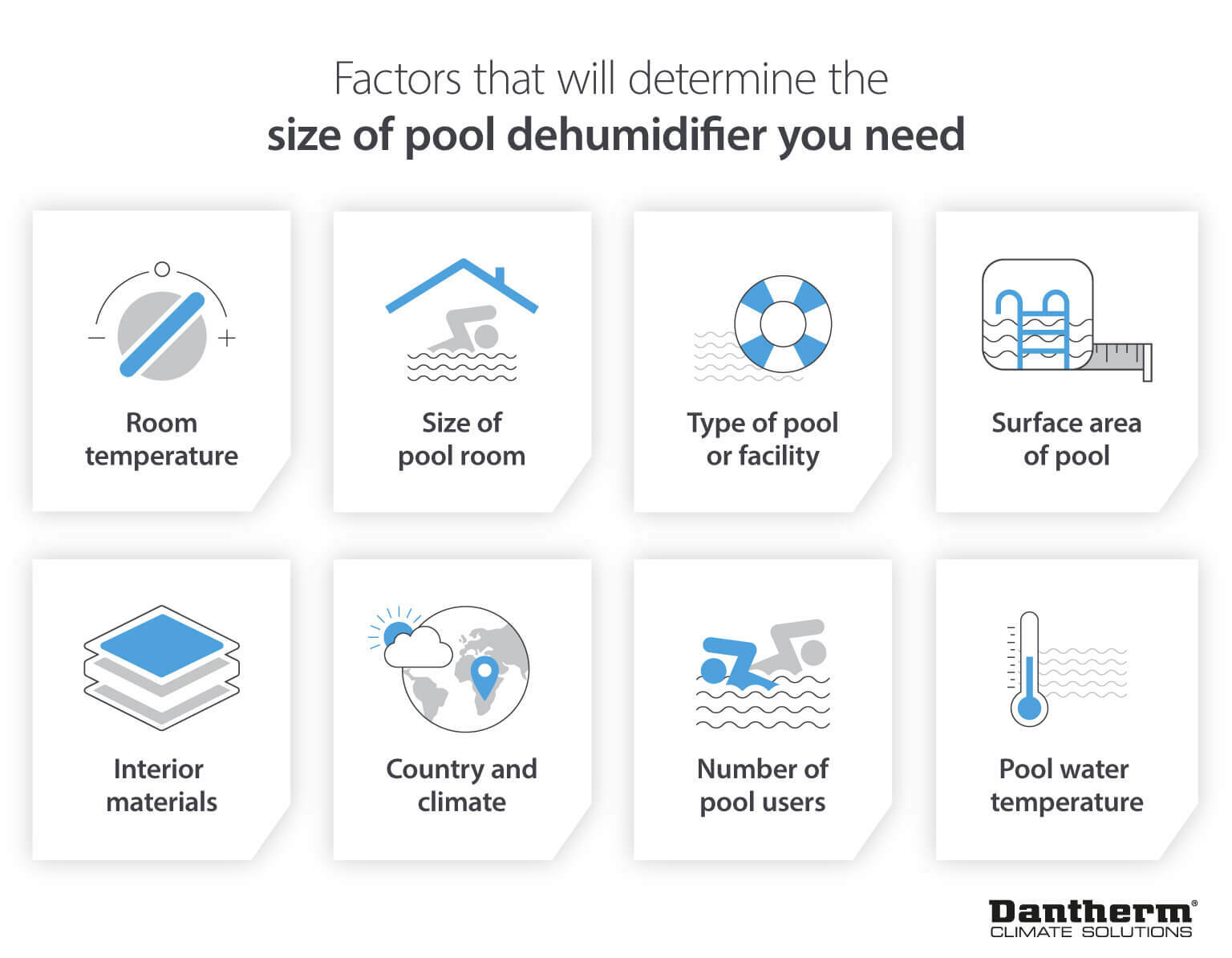
Choosing a unit with the right size and power is crucial to the sustainability, comfort and safety of your facility. If a dehumidifier is not strong enough to process the volume of air required, it will have little to no impact on your indoor conditions.
On the opposite end of the scale, a dehumidifier too powerful can create a draft that makes swimmers feel cold. Additionally, larger units are louder, consume more energy and send overhead costs soaring.
If you need professional advice and guidance, our team at Dantherm has decades of experience providing effective climate control solutions for swimming pools worldwide. Get in touch online, or fill out the contact form at the bottom of the page.
Can any dehumidifier be used?
As well as the size of your unit, it is also vital that you choose the correct type of system for the job.
Swimming pool dehumidifiers must be capable of operating in harsh pool environments. That means they are built to withstand chemical corrosion from the chlorine in the water. Furthermore, pool-specific units should operate at a lower volume and work effectively in warmer, wetter conditions.
Further factors to consider
Even though there are specific dehumidifiers built to thrive in the pool environment – not all are created equal. When choosing the optimal equipment, it is important to also bear in mind:
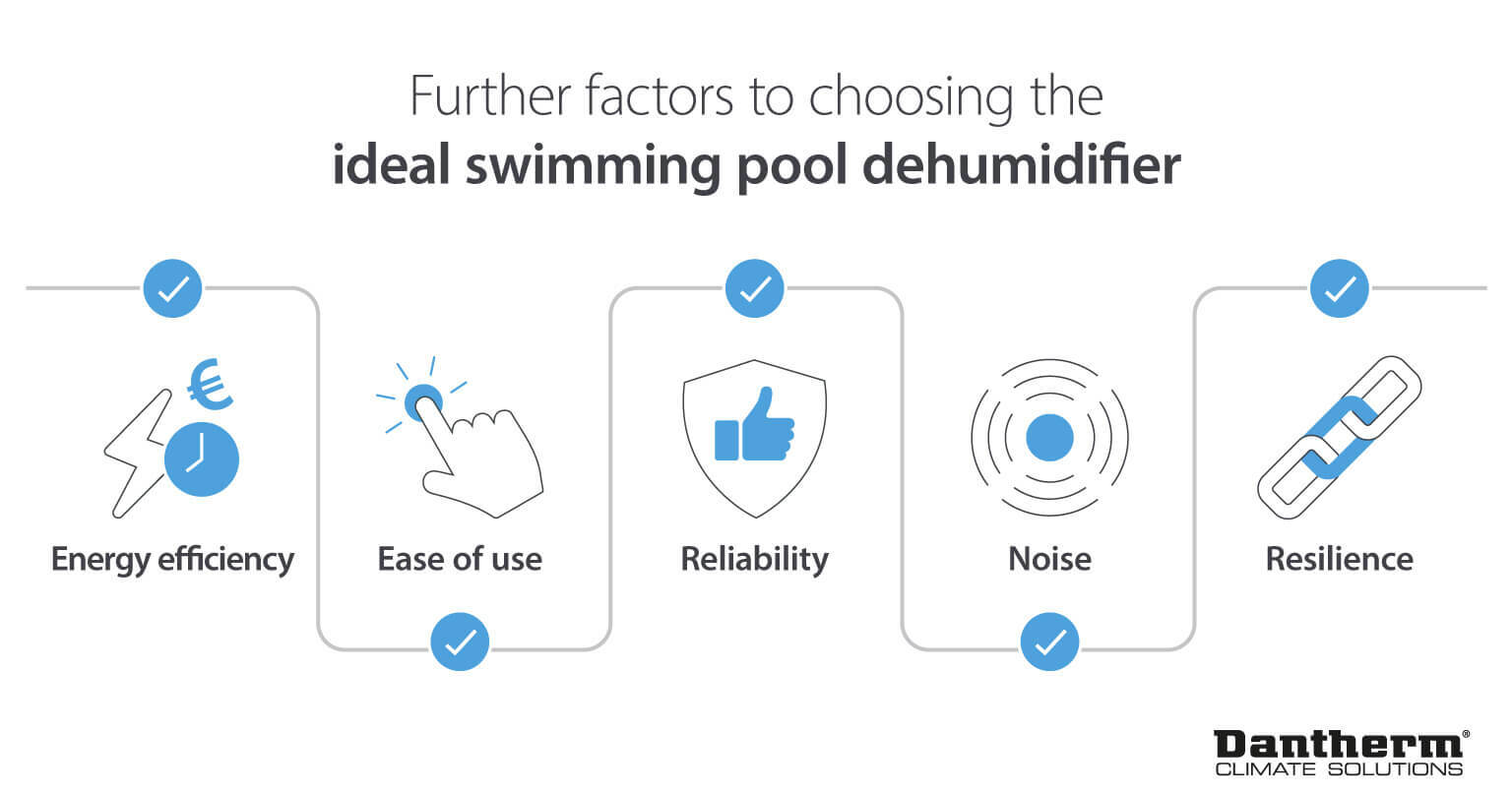
The benefits of a pool dehumidifier
As well as being more suited to the demands of your private pool, dehumidifiers also bring a number of distinct advantages to your facility:
Create a healthier environment
Air that is too moist can pose a threat to hygiene as the warm, wet air promotes the growth of mould and mildew. If this fungus is allowed to spread with ease, the spores released can cause irritation of the skin, allergic reactions and, in serious cases, asthma attacks.
By eradicating excess moisture and keeping the RH levels indoors at a safe level, you work towards building a healthy space for you and your guests to spend time in.
Improve pool comfortability
Pool dehumidification technology can also help improve guest comfort. By preventing the continual build-up of moisture in the air, you can ensure you and your guests stay comfortable year-round.
Plus, this additional comfort is complemented by solutions that help keep your energy bill down.
Protect the integrity of your pool building
Over the years high humidity has plagued large and small pool facilities, as the excess moisture in the air can deteriorate building materials and, over time, cause major structural damage.
As warm, moist air comes into contact with cold walls, doors and windows the air is cooled to its dew point – the state at which the water vapour condenses into droplets. With time, water can begin to seep into the fabric of the building and promote the growth of mould, causing wood to rot and metal to rust.
With an effective pool dehumidifier in action, the humidity of the inside air can be kept under control, limiting the amount of moisture that trickles into the structure of your building, preserving your facility for years to come.
Why would I use a dehumidifier over an air handling unit?
Although air handling units offer more capacity, as well as the ability to pull through fresh air and the potential for free cooling, swimming pool dehumidifiers offer the optimal balance between cost and capability that ideally suits use in private pool environments.
This is because the relatively compact size of dehumidifiers makes installation straightforward from the outset, requiring no costly renovations to your building. This differs from air handling units that require more complex installation and more space to house.
As well as that, pool dehumidifiers are highly cost-effective to run, while still delivering the right level of performance for your private facility. Air handling units, on the other hand, are designed for use in larger spaces such as commercial swimming pools.
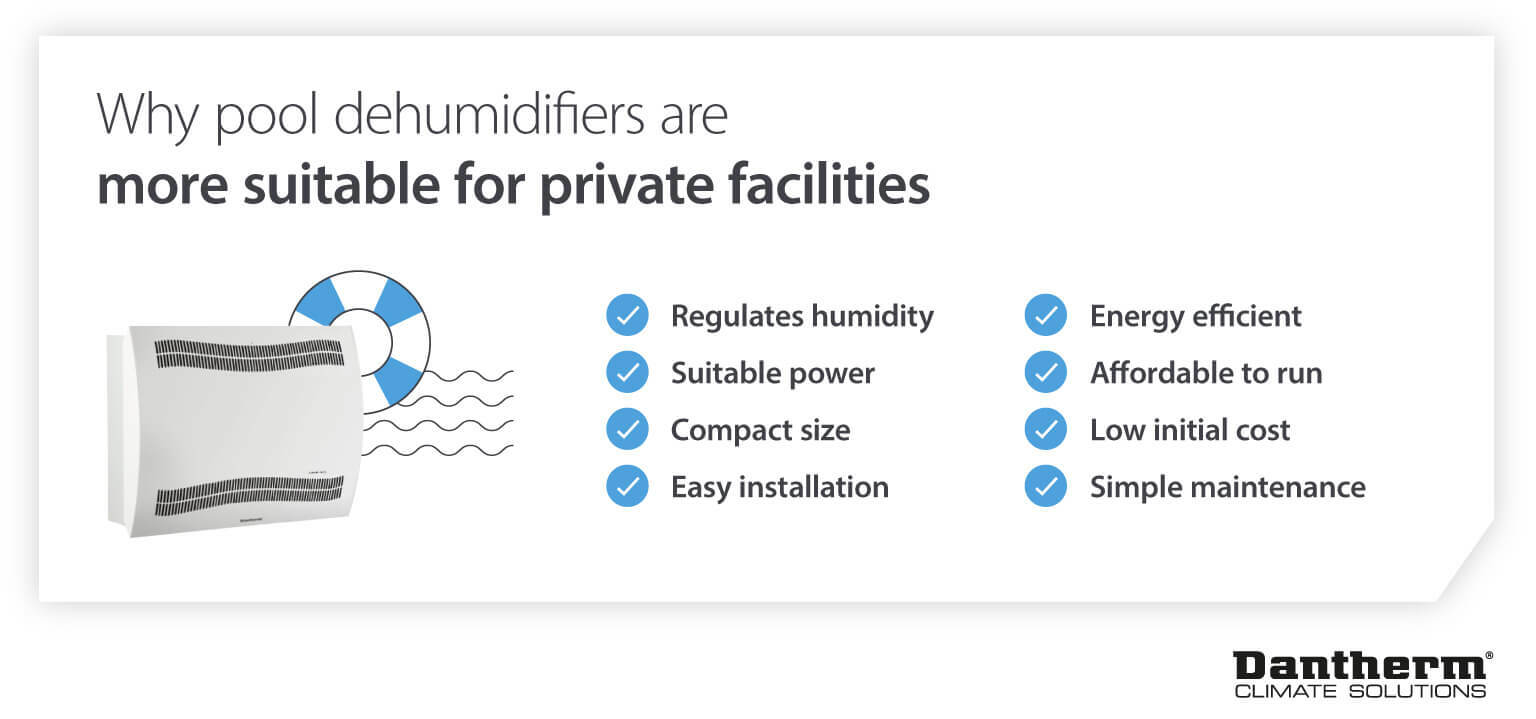
Which swimming pool dehumidifier should I buy?
Ensuring your swimming pool dehumidifier is fit-for-purpose goes beyond size and type – it is also important to consider factors such as energy efficiency and ease of use when making a purchase.
To help you choose the perfect device for your environment, Dantherm has over 60 years of experience in the world of climate control. With our expertise, we have developed a range of dehumidification units that focus on reliability, sustainability, efficiency and usability.
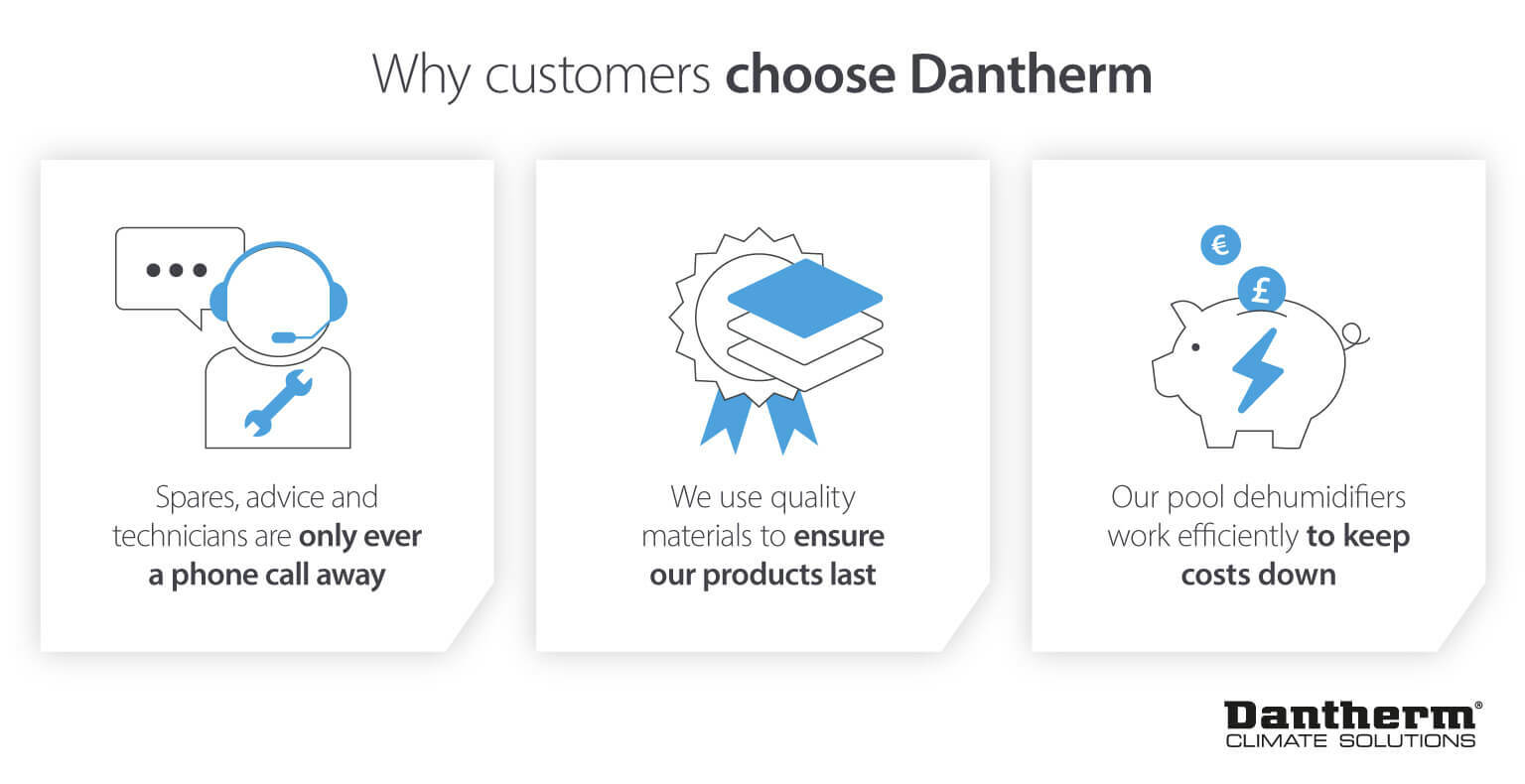
CDP 70T
One such dehumidifier is the CDP 70T, a highly durable wall-mounted swimming pool unit capable of delivering air flow up to 900m³/h.
Coming with an optional controller, your dehumidifier can work remotely, allowing easy operation and monitoring. Furthermore, to keep energy efficiency up and running costs down, we utilise efficient fans and compressors throughout.
Let us help you find the ideal dehumidifier for your private pool needs. Find our range of swimming pool dehumidifiers online, or get in touch using the form below.
Related products
Featured insights
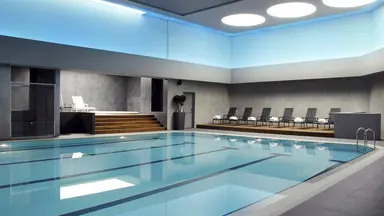
44 pages of expert advice to keep the air in indoor swimming pool areas healthy and comfy
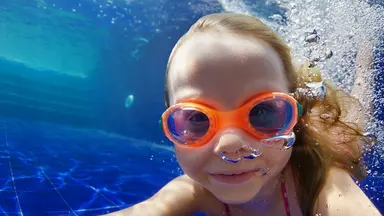
Swimming pool dehumidifier solutions for rental homes
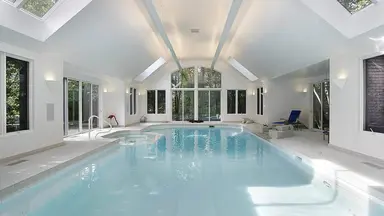
How to get humidity levels right
Need help with choosing the right solution? Our team of over 100 climate control experts can assist.
You can also reach out or join the discussion on our Social Media. Check out our LinkedIn page.
